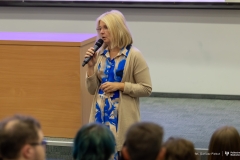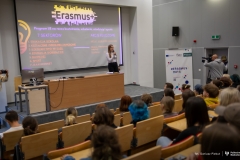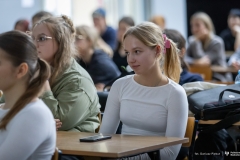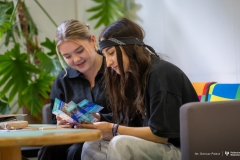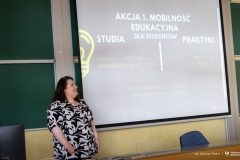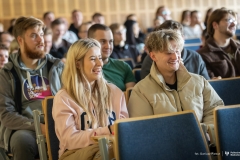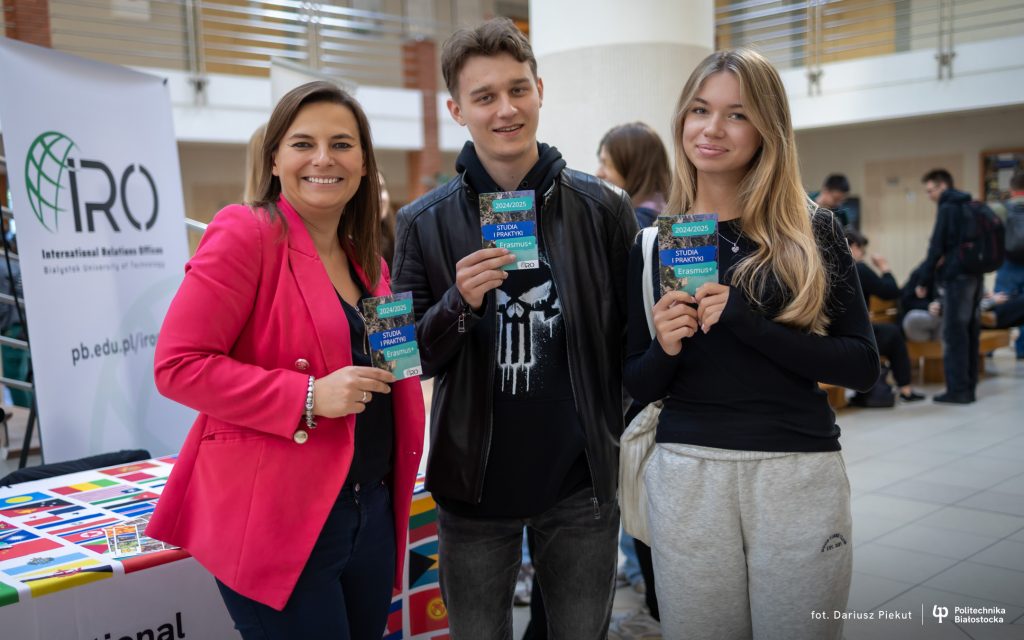
– Erasmus Days is our annual, week-long celebration, where we aim to meet with both students and staff from all faculties of Bialystok University of Technology, – says Assoc. Prof. Dorota Anna Krawczyk, DSc, PhD, Eng, Vice-Rector for International Cooperation.
– We organise information sessions for prospective students who wish to study at foreign universities in the future. We also present the experiences of students who have already been on exchanges, to inspire others to take part in mobility programmes. We also meet with international students who have come to our university – and there are many this year. In addition, we meet with academic staff to encourage their participation in the Erasmus programme. It’s satisfying to note that Erasmus Days result in a significant increase in interest in mobility. It’s worth noting that Bialystok University of Technology is one of the leading universities in Poland when it comes to securing these mobilities. That’s why we are keen to continue promoting the idea of Erasmus and encourage those who are undecided to take the plunge, – emphasises Assoc. Prof. Dorota Anna Krawczyk, DSc, PhD, Eng.
To participate in an Erasmus study exchange, students of Bialystok University of Technology must have at least a B2 level of English and an average grade from the last two semesters. They can go on exchange at any stage of their studies, for a maximum of 12 months. There are over 300 universities across Europe and beyond to choose from, with which BUT has signed mobility agreements. Additionally, BUT has 21 double-degree agreements with 17 universities in Europe and Asia.
Students of BUT most frequently choose universities in Spain, Portugal, and Italy. In the 2023/2024 academic year, 133 students from BUT went on an Erasmus+ exchange during the summer and winter semesters. Additionally, 19 students participated in internships abroad. The Faculty of Engineering Management at BUT had the highest number of students opting for a study exchange at a foreign university.
Meanwhile, more than 220 international students – including Erasmus+ students, full-time students, and students of the International School of Engineering (ISE) – have chosen to study at Bialystok University of Technology in the winter semester of the 2024/2025 academic year.
For many students, an Erasmus+ exchange is the adventure of a lifetime and an opportunity to study in an international environment. It’s a chance to gain valuable experience that can lead to better employment prospects and greater professional mobility.
For academic staff, an exchange at a partner university abroad is a valuable opportunity for professional development, both in terms of teaching and research. Erasmus+ is also available to administrative staff, who can see how similar units operate abroad.
During Erasmus Days, stands were set up at each faculty of Bialystok University of Technology where staff from the International Relations Offices and representatives of the Erasmus Student Network (ESN) discussed the benefits of the exchange programme and encouraged undecided students to participate. It was also an opportunity to meet Erasmus+ coordinators at BUT, who assist students in their contact with foreign universities.
Spanish Day at Erasmus Days 2024
For the first time, Erasmus Days included a day dedicated to one of the countries with which Bialystok University of Technology has vibrant academic cooperation. The Spanish Day took place on 16 October.
– This is a new format that we intend to continue in the coming years, introducing countries with which BUT is developing international cooperation. We’re starting with the Spanish Day because our university is very popular among students from Spain. This academic year, we welcomed a record number – more than 140! Spain is also very popular among our staff and students. We actively cooperate with 45 universities in Spain, offering plenty of choices. We are also promoting the outcomes of eight projects we are working on with Spanish universities, – says Assoc. Prof. Dorota Anna Krawczyk, DSc, PhD, Eng, Vice-Rector for International Cooperation.
The programme for the Spanish Day at BUT included language workshops developing cognitive, interpersonal, and cultural skills, as well as cooking classes and flamenco lessons.
The event was inaugurated with guests from the Embassy of Spain in Poland and the Cervantes Institute in Warsaw.
A touching moment was the online meeting with staff from Spanish academic centres.
Pilar C. Izquierdo Gracia from the Universidad Politécnica de Madrid visits Bialystok University of Technology almost every year. Among the academic staff at BUT, she has a loyal group of friends with whom she collaborates on organising international summer schools for students from Poland, Spain, and Lithuania. She is also eager to help Polish students find their feet at the university in Madrid.
Alicia Betts from the University of Girona also had the opportunity to visit BUT. She participated in the winter and summer editions of International Training Week, another initiative organised by the university to integrate its international partners. She joked that during these stays, the hardest part was adjusting to the meal times. Nevertheless, she is excited that the partnership between the University of Girona and BUT will grow even closer. Both universities, along with seven other academic centres, are jointly forming the European University Across.
Some of the events of the Spanish Day took place in the Białystok NieTeatr. The event for guests of BUT was hosted by Conrado Moreno – a popular presenter and actor with Polish-Spanish roots, known for shows like “Europa da się lubić” and “Dancing with the Stars.” There was a flamenco performance by the Rada Dance Art group, Fiesta Española – a guide to the flavours of Spain, and presentations by BUT staff members Dorota Gawryluk, PhD, Eng, Arch., Maciej Kłopotowski, PhD, Eng, Arch., and Jerzy Hermanowicz, MA, who shared their fascination with Iberian culture and how it inspires deeper research into the architecture and art of Spain.
Internationalisation among BUT’s priorities
As part of its internationalisation strategy, Bialystok University of Technology promotes the culture and traditions of the countries with which it has educational partnerships. Initiatives such as Erasmus Days, International Training Week, and the “Welcome at BUT” project serve this purpose.
The university offers its students the opportunity to study in another country and to obtain a double degree – from both BUT and a foreign university. This is a valuable addition to any professional CV and an asset for a future international engineering career.
Each year, Bialystok University of Technology ranks among the top Polish universities in terms of student mobility. The largest technical university in north-eastern Poland, BUT, together with partner universities from eight European countries, also forms the Across “European University for Cross-Border Knowledge Sharing.” This initiative was recognised in the 5th edition of the competition announced by the European Commission under the Erasmus+ programme and secured funding of nearly €14.4 million. In this way, BUT joined the prestigious group of European universities as the only institution from our region.
Erasmus Days are organised by the International Relations Offices of BUT, together with the Erasmus Student Network at Bialystok University of Technology. The Spanish Day was made possible with funding from the EU. The event was held under the honorary patronage of Assoc. Prof. Marta Kosior-Kazberuk, DSc, PhD, Eng, Rector of BUT. Partners included the Podlaskie Voivodeship, Dwór Czarneckiego, NieTeatr, and the Bialystok University of Technology Alumni Association.
by mr










































